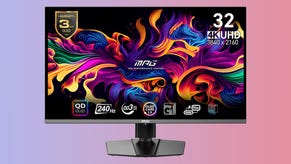AMD Radeon RX 7800 XT/7700 XT review vs RTX 4070/4060 Ti
7800 XT is worth buying now, but 7700 XT could be cheaper.
The final RDNA 3 cards are fine performers then, but AMD's pricing seems to be following the same route as that of the RX 7900 XT/XTX, with the cut-back 7700 XT seeming to exist largely to upsell consumers to the fully-enabled 7800 XT. We eventually saw the 7900 XT reduced to a price level where it made more sense, and I'd speculate that we'll see a similar adjustment for the RX 7700 XT to make it a truly viable option down the road.
In the present, the $499/£479 RX 7800 XT is well worth the extra $50/£50 asking price in basically all of the games we tested, with some titles running upwards of 20 percent better on a card that costs ~11 percent more - without taking into account the AMD reference card's fancier design and extra VRAM.
Versus the RTX 4070, it's a more complicated calculus. AMD's card offers upwards of 10 percent better performance in rasterised (non-RT) titles with 4GB more memory at a $100 lower MSRP. On the other hand, the 4070 takes the frame-rate lead with RT engaged by around 15 percent, costs less to run thanks to its better power efficiency, and sports a better complement of features, with DLSS 3 frame generation tech having an adoption head start against FSR 3, DLSS generally producing better resolve than FSR 2 and impactful DLSS 3.5 tech coming soon to Alan Wake 2 and Cyberpunk 2077. I think AMD have done just enough to make the 7800 XT the better option for most people, but arguments could be made for either card depending on your preferences.
The $449/£429 RX 7700 XT has an 'easier' opponent in the RTX 4060 Ti, with that card's many foibles - its limited VRAM allocation, its relatively disappointing gen-on-gen performance uplift over the RTX 3060 Ti - but I'm not entirely sure that the RX 7700 XT has delivered a knock-out blow, especially in the wake of RTX 4060 Ti 8GB and 16GB price cuts that see the Nvidia cards as low as $379 and $449 respectively - at the time of writing.
The 7700 XT does offer substantially better non-RT performance than the 4060 Ti in almost every game we tested, often by 20 to 30 percentage points, and that margin allows it to offer largely equivalent performance in tougher RT tests too - but the Nvidia card is (at least) $50 cheaper and has DLSS 3. At $399, the 7700 XT would be a slam dunk, but at $449 it's a closer-fought race than Team Red would prefer - and truthfully, if both new AMD cards are available at MSRP, then the 7800 XT is the obvious pick.
Finally, while the RX 7700 XT represents quite a keen upgrade over the prior-gen RX 6700 XT, the RX 7800 XT often recorded surprisingly similar results to the RX 6800 XT. We saw 1440p results within a five percent margin in the likes of Cyberpunk 2077 with RT, Forza Motorsport 5, F1 22 and Returnal, although the gap was wider elsewhere. The cheapest RX 6800 XT is retailing for around $485 and is likely to drop further once the 7800 XT is available, so this could be a nice bargain option if it shakes out to be more than 10 percent cheaper than the RX 7800 XT - though you would be losing out on better power efficiency and the HYPR-RX features exclusive to AMD's RDNA 3 cards.
All things considered, the graphics card market ought to be in a healthier place with these two new Team Red GPUs. The RX 7800 XT offers a genuinely convincing combo of performance and features at its $499/£479 MSRP, while the RX 7700 XT holds up well against the 4060 Ti and 6700 XT, only suffering in comparison to the 7800 XT at $50/£50 more.
AMD RX 7800 XT/7700 XT Analysis
- Introduction
- RT benchmarks: Dying Light 2, Cyberpunk 2077, Control
- RT benchmarks: Metro Exodus Enhanced Edition, F1 22
- RT/DLSS/FSR2/DLSS3 benchmarks: Cyberpunk 2077, Dying Light 2, Forza Horizon 5
- Game benchmarks: Control, Cyberpunk 2077, F1 22, Forza Horizon 5
- Game benchmarks: Hitman 3, A Plague Tale: Requiem, Returnal
- Conclusions and recommendations [This Page]









